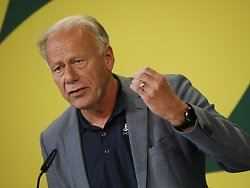Thursday, November 25, 2021
Trittin and Stegner at Lanz
The tamed tigers
By Marko Schlichting
Seldom has there been so much unity. In the afternoon, the traffic light parties present their coalition agreement. In the various talk formats in the evening, there are mainly politicians from the SPD, Greens and FDP who emphasize their similarities. Markus Lanz’s midnight program on ZDF is no exception.
Ralf Stegner and Jürgen Trittin are separated by a lot. Stegner has just become a member of the Bundestag, Trittin has been a member of parliament for 23 years. Stegner was finance and interior minister in Schleswig-Holstein, Trittin was federal environment minister. One is a social democrat, the other belongs to the Greens. But there are also some similarities. Both are attributed to the left flanks of their parties, both known for not mincing their mouths. And both of them not only held back on Wednesday evening with Markus Lanz on ZDF astonishingly, they also complemented each other perfectly in their statements. Almost like a little boys’ choir. Admittedly: a choir no longer very young boys. But that remains to be seen.
There was agreement on the statements about the coalition negotiations (we don’t say anything), on the selection of ministers (Olaf Scholz decides on that), on the subject of human rights (for), on the restructuring of industry (it has to come now), on the discussion of a general one Compulsory vaccination and cannabis approval. And they were also in agreement about the politician, about whom they scolded a little: Markus Söder.
Trittin delivered the biggest platitude of the show. Forming the coalition was a difficult process, he said, and: “We have learned a lot from each other.” And then the sentence of the evening: “The willingness to get involved in such a process has made the community what it is.”
What does Jürgen Trittin like about Christian Lindner? Asks the moderator. And Trittin replied obediently: “You don’t have to like each other in a coalition, you have to respect yourself. And respect has grown.” And so it went on happily. Stegner: “The discipline was a bit bigger than I know from the last coalition negotiations.” Stepping in to a possible health minister Lauterbach: “We’re not getting involved.”
Sanctions against Belarus
While discussing the situation in Belarus, Trittin woke up a little without giving the impression that his pulse had gotten much faster. But he made a suggestion of how effective sanctions could look against the country whose President Lukashenko continues to violate human rights. The only legal source of income for Belarus is their potash industry, said Trittin – and demanded: “There just has to be the announcement that Belarus can no longer sell potash in the EU.”
Industry and human rights
The coalition agreed that human rights in countries like China had to be addressed again and again, said Stegner. In order not to become economically dependent on such states, efforts must also be made in Europe, especially in the area of digitization. “We have to show that the restructuring of the industry will work for us, that is the only thing that will interest the Chinese,” said Stegner.
The relocation of power lines from the north to Baden-Württemberg and Bavaria is important for the change in industry, said Trittin. These are underground routes, which are cheaper in the end, because they reduce the objections to it and thus the planning and construction time. The construction of these lines would have to be cut in half from ten to five years. “The alternative to renewable energies is either radiating nuclear power or smoking chimneys,” Stegner summarized. Lanz asks about Bavaria’s rejection of the routes, and Stegner takes the first blow against the Bavarian Prime Minister: “That is the value chain, and Söder will have to see that. He will have to see a lot more.”
Stop criminalizing cannabis use
The second blow against Söder was Trittin. At the end of the broadcast, Lanz addressed the planned cannabis release. In the future, this should be checked in special shops and only sold to adults. “We are concerned with the protection of minors,” said Trittin, explaining the initiative that is to be reviewed in four years’ time. Basically, the traffic light coalition does not want to promote drug consumption. “It is not intended to say that anyone can smoke their hats.”
Bavaria’s Prime Minister Söder recently criticized the approval of cannabis. And Trittin now gave the answer: “A state government that regrets that it does not allow the largest drug scene in the world, the Oktoberfest, to take place, should hold back.”
You definitely see it differently in Bavaria, the author of this article, who lives in Munich, knows.
